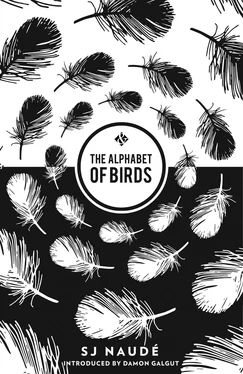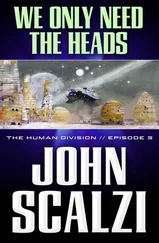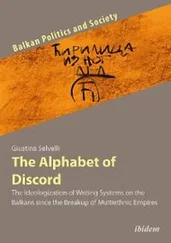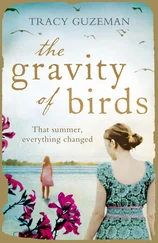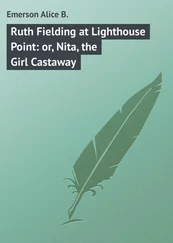‘I’m not really in the mood.’
‘How about Bayreuth?’
Before they came, he told Joschka he would like to visit Bayreuth to see the opera house and Haus Wahnfried, Wagner’s villa.
‘Come,’ Joschka says, ‘come.’
He gives in. They drive in silence.
They walk through Haus Wahnfried. The sacred atmosphere would normally irritate him, the way in which the place is curated so as to render one complicit in worshipping the master, but his attention is elsewhere. All of this makes no impression on him. He is listening to his own footsteps, and Joschka’s. In the main room, the salon-cum-music-room, they walk along opposite walls. The room protrudes into the garden, in a half-circle with large windows. Here they meet, here they come face to face with each other, each with a hand on the grand piano. They look out into the garden, to the granite grave of the god himself. Far back, beyond a fountain. Joschka looks down at the piano.
‘Will we never look each other in the eye again?’
It is Joschka who says this, before moving away. On the piano, on the black lacquer, the shape of his hand remains for a few seconds in a whisper of vapour before it disappears.
After lunch, back home in the castle, they visit Joschka’s aunt. She is ninety-two. When Joschka first asks him to come along, he says: ‘You go. I don’t feel up to it.’
He is lying on the aeroplane-patterned duvet, facing the wall.
‘Please,’ Joschka says behind his back. ‘I told her about you. She’s expecting both of us. She wants me to come and show you to her. Please.’
They go. The aunt is small and fit and shy. Never married. Her speech is nasal (a split palate). She would go to pick chanterelles at dawn, on her daily wander through the woods, before swimming twenty-four lengths in the pool at the American army base. The house smells yeasty, of the fresh mushrooms, of soil. And chocolate cake. Chlorine, when one gets close to her. In her presence there is a new Joschka, softened to the core.
‘I taught him to bake, this Junge ,’ she says while taking the cake from the oven, Joschka beaming behind her in the heat. There is apple tart too.
They come from her garden, she tells them. The apples.
To demonstrate, she opens the window and picks an apple from one of the branches abutting the house. She is wiry, as he sees when she bends over. A forest woman, a survivor. She offers him the apple.
Back home, he says, ‘I am going for a walk.’
‘I’m coming with you,’ Joschka says.
‘No, alone.’
Outside the gates, he walks along a curved footpath, further up the hill. He walks past a small wooden hut, a forest ranger’s house. He stops for a moment, looks out over the next valley, parallel to the one overlooked by Burg Heimhof. Downy seeds drift around him, catching the sunlight. There are white butterflies around his feet. The path turns increasingly wet and slippery where it approaches the forest. It reminds him of an Anselm Kiefer exhibition he and Joschka saw in London, in the white subterranean cube of a Mayfair gallery. Canvases ten metres wide layered with paint and mud as deep as the span of a man’s hand. One could not refrain from touching it. It was not the representation of a landscape of mud and sludge. It was the landscape itself.
Then he is in the forest.
When he closes his eyes, he is no longer in a pine forest, but in the cliché of the German forest. A dim place of antique oaks with interlocking branches. He wants to feel all the things that hover here right on his skin, wants to shift them across each other like a quadruple exposure: myths and music, history and landscape. A richly decorated Szene . It is becoming colder the deeper he goes. In this air, one could perhaps even, with sufficient concentration, stir up all the twentieth-century European horrors. He stops, opens his eyes. It is just a dead forest. Absolute silence. The signs are hidden, the codes illegible beneath the floor of pine needles, antique blood seeped deep into dark soil. Out there, from where the light is filtering in through the forest’s edge, the Vierte Reich reigns: American military bases, BMWs and highways like deep blue rivers. It is the outside realm that gives the forest meaning, not the other way around. It renders the forest small and harmless. The force drained from everything, the claws filed blunt.
His cellphone rings in his pocket. A muted sound amongst the pine needles. He is surprised there is signal coverage here. It is his father.
‘It is about your mother,’ his father says, his voice unsteady. ‘She wanted to tell you yesterday, but she couldn’t.’
‘What is it? What did she want to say?’
‘She wanted to tell you, but couldn’t.’ His father’s voice is strange. He utters a wild sob. ‘She is ill. Liver cancer. It’s spread to the lungs. And the brain. There won’t be treatment.’
His father puts down the receiver. He leaves the path, deeper into the forest. As he walks, the tears come.
A miniature scene is all he is capable of. He can only put together the small pictures, in a chaotic fashion: he and Joschka, fragments of the castle, the house with the room full of plastic swords, the fragments of forest around him, his own worry and sorrow. His mother: she stays on the edge of the photo, too over-exposed to recognise, the continent where she finds herself too cut off from everything northern.
He stops, looks up, listens for birds. All he can hear are the lines, something from his school days, which he now starts reciting:
Über allen Gipfeln
Ist Ruh,
In allen Wipfeln
Spürest du
Kaum einen Hauch;
Die Vögellein schweigen im Walde—
The voice of a bird, somewhere above the pines (they will not venture into the dead dusk down here), sweeps away the calm peaks and windless treetops of the poem: ‘ Sie bricht herein! Sie bricht herein! Die dunkle Nacht der Seele …’
‘Don’t bother,’ he says, ‘with the warnings and the mockery. It’s already enveloping me from all sides.’
He gets bored of being lost. Time to go back; soon the sun will set. He crosses paths he has probably walked on before, encounters a pile of pine trunks he is convinced he recognises. Sometimes he sees light and thinks it is the forest edge, but then it turns out to be a clearing. He crosses open areas with wild flowers that look familiar, a square of blue sky above him. He is starting to get worried. Occasionally he encounters a viewing tower for fire watchers. He climbs the ladder of one such tower, hoping he might be able to see Burg Heimhof on its rock amidst the forests and valleys. When he has almost reached the top, he finds the trap door above him locked shut, confirmed with a sign: Zutritt verboten .
He wanders around for another hour, searching for light. Then he hears the bass line of music. He follows the sound. Furious German rap. He imagines a skinhead next to a boom box, tattooed on his neck or shaven temple. Then the music is joined by light. He is out. In a dark fold against a northern slope, a small village with featureless modern houses. Right up against the mythical/non-mythical forest. Two young men with spits in their hands. They are roasting bratwurst over open flames, the music emanating from the house. He needs to cross a corner of their garden. They look at him. He does not look at the spits. He walks along a tarred road, there are road signs, he emerges in the valley below the castle. He sees the place from a new angle. From down here it seems like an extension of the cliff.
Upon his return, the little house in the castle smells of baking. Joschka is at work in the kitchen. He avoids the kitchen, goes to lie down on the plane-patterned duvet.
Читать дальше
